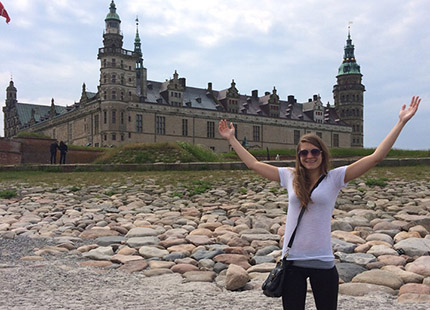Why did you choose this program? I chose this program because I wanted to travel to a country not many people I knew had been too. This program was also very flexible with my psychology minor.
Describe your favorite class abroad. I took a Food and Identity course. My professor Lisa Abend is a correspondent to Time magazine and writes for Food and Wine magazine. From her, I learned about how what you eat around the world depends on the region and how each region has adapted different cooking styles and reasons for these styles. We took a week long study tour to Barcelona where we were able to explore local markets, wineries, and restaurants to learn more about a culture's food and its true identity in life.
What was the housing like on your study abroad program? I lived in the heart of Copenhagen in a DRC. My DRC had three floors, each with their own kitchen and living room shared among eleven roommates and their SRA. I loved this living situation, because I find myself to be more social and I enjoy living with other people. My living situation was a great way to meet students from the United States who were also part of the DIS program.
What advice would you like to give to future study abroad students? Everyday go and explore something new. If you become overwhelmed, take one personal day, but after, find one new place to explore or visit every day. You're only there for a short time so make the most of it.
What’s your best memory from your time abroad? My best memory of being abroad was during my study tour to Barcelona. On a Spanish holiday, my professor took us on a sail boat with two sailers she previously knew from studying abroad herself. We were able to sail and swim in the Mediterranean sea while learning about fishing from the sailers. Later that night we went to a vineyard where the owner and his wife personally cooked our entire class dinner in the middle of the vineyard. It was the most relaxed and enjoyable day of my life.
What was your biggest surprise about the location, culture or other aspects of your program? I was shocked at the amount of English that is spoken in Denmark. Every citizen learns English in the third grade and everyone willingly speaks English to you whenever you ask for help or directions.
Describe your experience with culture shock or reverse culture shock. I did not experience culture shock while being abroad. However, coming home, I felt extremely overwhelmed. After being in a country where everyone rides bikes or walks, getting back into a car was very different after seven weeks abroad.
“If I could do it over, I would…” I would have traveled to more countries over the weekend. Airfare is very inexpensive compared to the United States and I wish I would have traveled to more countries.
What do you wish someone had told you before you left? Not to pack as many clothes as I did. Copenhagen is not very warm and I brought several short sleeve shirts and shorts. I wish I would have left those at home and brought more jeans, leggings, and sweatshirts.
What was your greatest challenge? Grocery shopping was a huge challenge for me. I am allergic to nuts, shellfish, raw eggs, and honey. I would carry lists of different names for these items in Danish with me while grocery shopping so I knew what I could and couldn't buy.
Discuss: “Going abroad vs. staying on campus.” Going abroad opens your eyes to what is really going on around the world. Studying in a socialistic country where healthcare and education through college is free was very different then in the United States. The ideas people have around the world are very different then the beliefs and ideas Americans hold. Going abroad helps you to understand the world better and understand cultural differences.
What fact about your host country do you think people would be surprised to learn? People in Denmark love early 2000s music!


